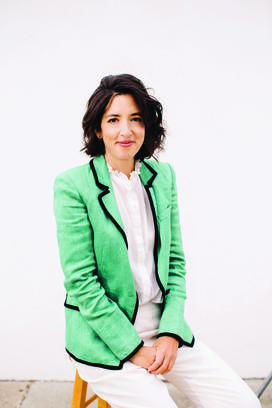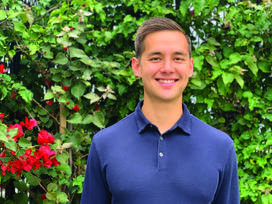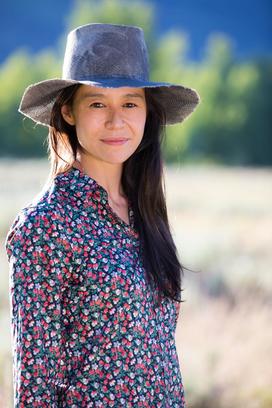Q&A: Hollywood Tigers Reflect On Paths to Careers in Film
“I think you have to be a little bit damaged by your love of storytelling to be successful in this business”
Ahead of the 96th Academy Awards, which will air on Sunday, March 10, PAW asked five Princeton alumni working in film about their journeys in Hollywood and what advice they would give to current students and recent graduates hoping to break into the industry.
Eli Stern ’19
Director and writer of ‘California King’

What was your first job in Hollywood after Princeton?
I did a rotational internship at Bad Robot Productions, (filmmaker) J.J. Abrams’ company. I interned there after my junior year, and that led to going back after I graduated.
What skills from Princeton transferred well to your career?
The ability to multitask. It’s a multidisciplinary industry. There’s lots going on. It’s chaotic. You have to keep a cool head. The workload and being an athlete translated really seamlessly. … Also, hard work and determination are pretty underrated in creative industries. You look at creatives and think they just have this spark of brilliance. That’s almost never the case. It comes down to who can work the hardest and the longest. That kind of determination and work ethic was instilled at Princeton.
What’s the best advice you’ve gotten about the industry?
It’s not personal, even though it can feel very personal. You have to focus on your process. And if you can focus on and feel confident about your process you won’t care as much about the results, because the results are so much out of your control.
What advice would you give to a Princeton student who doesn’t have prior experience in the industry on how to break in?
Lean on the network. It’s a network-heavy industry. There are lots of alumni who are always excited to help. Also, location matters. It’s harder to break in without being in L.A. or New York. Tell people to feel free to reach out to me. And also, just try to make stuff as much as possible early on. Make stuff with your friends. Shoot on a phone. It doesn’t have to be film-related. Write poetry, write whatever. Make stuff and show it to people early on.
What was your favorite movie you saw as an undergrad?
I did a deep dive into Korean cinema. Watching Oldboy for the first time was life-changing. With football, there wasn’t a lot of time for going to theaters. I watched it on my laptop in my dorm room.
Kiska Higgs ’01
President of production and acquisitions at Focus Features

[After graduation] I’d put down a deposit on an apartment in New York, thinking I would get a job in investment banking or magazine publishing when I got there. Then 9/11 happened. I ended up going back home to California for a bit. My first job was in the mailroom at Endeavor, which is now WME. Then, I became an assistant to an agent.
What skills from Princeton transferred well to your career?
As a philosophy major, you learn to make sense or at least peace with chaos, which is helpful in Hollywood. I recently did a movie with Ethan Coen ’79, and he was a philosophy major, too. We’ve talked about how we had a lot of the same professors. I loved Alexander Nehamas *71’s class. [Q: Was that the Nietzsche class?] Yeah. Nietzsche will prepare you for Hollywood.
What was your favorite movie you saw as an undergrad?
Boogie Nights, my freshman year.
Abhijay Prakash ’98
President of Blumhouse

I changed career paths after Princeton and moved west when the internet was happening the first time. That led me to my first job in corporate development at Artisan Entertainment (now part of Lionsgate). For folks interested in entertainment, it’s a much broader business than you might think. I thought there were people who made movies and people who got coffee for the people who made movies. It certainly was eye-opening for me that there are many different ways to be involved with entertainment.
What’s the best advice you’ve gotten about the industry?
You have to pick a lane. Decide if you want to grow up on the creative side or the business side. But, eventually, those paths arc back together. If you grow up on the creative side when you get senior enough, you’ll have to understand the business side too. And if you grow up on the business side, you’ll eventually need to weigh in on what scripts you’re making and what talent you’re doing deals with.
What advice would you give to a Princeton student who doesn’t have prior experience in the industry on how to break in?
For Princeton students in particular, demonstrating achievement in structured ways and that leading directly to the next stage of opportunity is often important. You can’t follow that as cleanly in the entertainment industry. However, the good news is, critical thinking, hard work, and preparation are all still critical to being successful.
What was your favorite movie you saw as an undergrad?
The Garden was a regular stopping point for me. I distinctly remember going to see an indie comedy called Swingers. Doug Liman directed it. It was a script written by Jon Favreau. It was done in a real indie down-and-dirty style. It took me a few years from that moment to get out to L.A., but then I actually [worked] with some of those same people on a movie called Made. It was a nice full circle moment.
What are your tips for dealing with the uncertainty that’s inherent to pursuing a career in Hollywood?
I think you have to be a little bit damaged by your love of storytelling to be successful in this business. You have to honestly ask yourself if that burning desire is there. If you’ve got that, that gets you over the hump for the courage to go try it. If you don’t, you won’t make that leap.
Max West ’19
Motion picture literary agent at WME

I interned first at ICM Partners, which was then one of the four big talent agencies. I interned there first after my junior year and then went back as an assistant full-time after graduating.
What’s the best advice you’ve gotten about the industry?
Read and watch as much as you can and try to build up your taste. Your taste is what people will come to know you for and rely on you for. Some people are born with great taste, but for most of us it’s something that can be built up over time by reading and watching a lot of material. As you do, you’ll have a much greater awareness of all the material out there, and you’ll be able to talk about why the scripts you love are so great a lot more intelligently.
What are your tips for dealing with the uncertainty that’s inherent to pursuing a career in Hollywood?
I started in the fall of 2019 when the writers fired their agents in the ATA (Association of Talent Agents) dispute. Then COVID happened. Then, the WGA (Writers Guild of America) and SAG (Screen Actors Guild) strikes. It truly feels like change has been the only constant. One thing that’s been helpful is relying on the Princeton network. Especially in such a relationship-driven business that can be very powerful. Princeton alums are generally so willing to lend their time and expertise to help people break in and advance.
Elizabeth Chai Vasarhelyi ’00
Filmmaker (‘NYAD,’ ‘Free Solo,’ and ‘Meru’ )

I began making my first film, A Normal Life, as part of my senior thesis. That movie was made on the kindness of others. I had been an intern at World News Tonight, and when we got to Kosovo, they let us sleep on the couches of their press house. We wrote a thousand grants. I lived with my parents and edited in their basement. My dad paid my health insurance. The [day after that film won Tribeca], I went to a book party where I met Mike Nichols. I was debating whether or not to go to film school, and he said, “Why don’t you just come work for me?” I was his personal assistant on Closer. At the end of that year, he said “Go make another movie.”
What skills from Princeton transferred well to your career?
Artists have to be able to articulate [themselves] and [their] ideas. I took the HUM (humanities) sequence, and I still think back to (comparative literature professor) Robert Fagles’ class where we read his translations. I return to those classics often. All the literature I studied at Princeton was really valuable. It’s ingrained in my mind, my brain, my heart.
What’s the best advice you’ve gotten about the industry?
Make a list of people you really respect and admire who you would want to work for, and then reach out to them. Do everything you can to get to them. Time is precious. You never know who is going to say yes. Also, it’s never too late to write a thank you letter. Ever. It could be two years later. It still matters.
What advice would you give to a Princeton student who doesn’t have prior experience in the industry on how to break in?
Ask for what you want. It’s OK if they say no. People will remember if you were polite and accepted a no. Then, you can ask again. It’s OK to be ambitious. That’s especially important for women, who [can feel] like the world is stacked against them.
What was your favorite movie you saw as an undergrad?
Le Joli Mai. It’s a Chris Marker film that looks at Paris during and after the Algerian war. It’s kind of what launched me into documentaries.
What are your tips for dealing with the uncertainty that’s inherent to pursuing a career in Hollywood?
I find the financial uncertainty to be scariest. I was very fortunate my parents allowed me to stay with them and paid my health insurance early on. For artists, I think the uncertainty comes with the territory. It’s vulnerable. That means that whatever you work on, you have to really believe in.
Interviews conducted and condensed by Jake Caddeau ’20










No responses yet